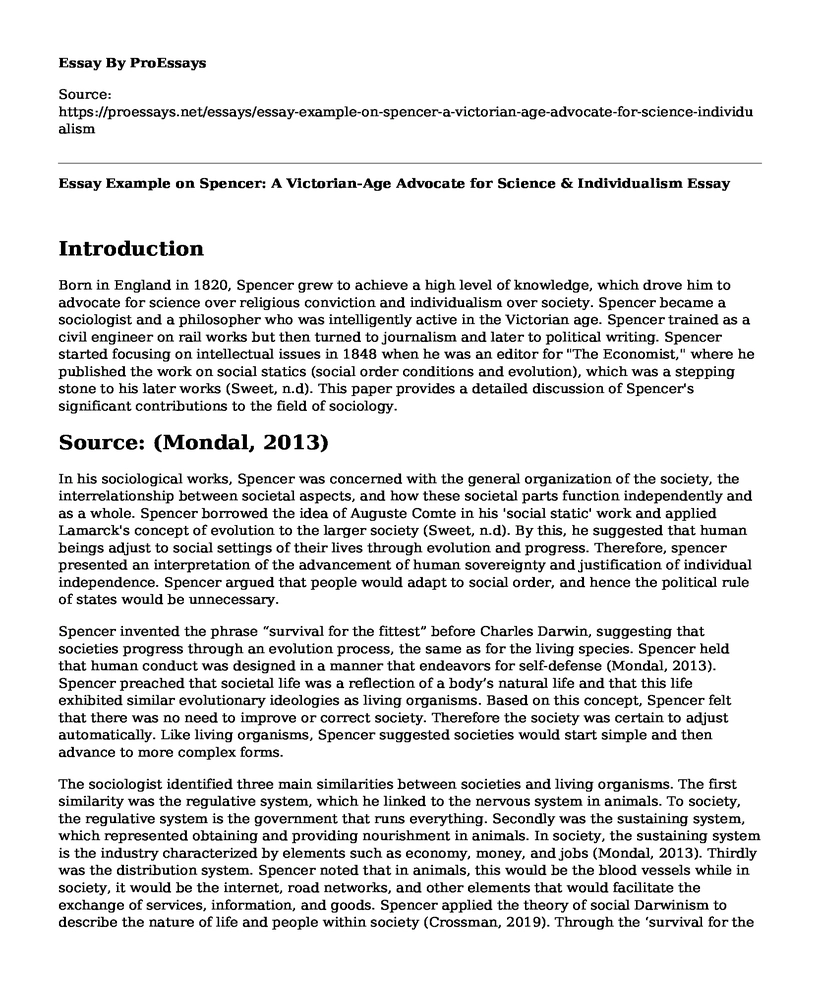Introduction
Born in England in 1820, Spencer grew to achieve a high level of knowledge, which drove him to advocate for science over religious conviction and individualism over society. Spencer became a sociologist and a philosopher who was intelligently active in the Victorian age. Spencer trained as a civil engineer on rail works but then turned to journalism and later to political writing. Spencer started focusing on intellectual issues in 1848 when he was an editor for "The Economist," where he published the work on social statics (social order conditions and evolution), which was a stepping stone to his later works (Sweet, n.d). This paper provides a detailed discussion of Spencer's significant contributions to the field of sociology.
Source: (Mondal, 2013)
In his sociological works, Spencer was concerned with the general organization of the society, the interrelationship between societal aspects, and how these societal parts function independently and as a whole. Spencer borrowed the idea of Auguste Comte in his 'social static' work and applied Lamarck's concept of evolution to the larger society (Sweet, n.d). By this, he suggested that human beings adjust to social settings of their lives through evolution and progress. Therefore, spencer presented an interpretation of the advancement of human sovereignty and justification of individual independence. Spencer argued that people would adapt to social order, and hence the political rule of states would be unnecessary.
Spencer invented the phrase “survival for the fittest” before Charles Darwin, suggesting that societies progress through an evolution process, the same as for the living species. Spencer held that human conduct was designed in a manner that endeavors for self-defense (Mondal, 2013). Spencer preached that societal life was a reflection of a body’s natural life and that this life exhibited similar evolutionary ideologies as living organisms. Based on this concept, Spencer felt that there was no need to improve or correct society. Therefore the society was certain to adjust automatically. Like living organisms, Spencer suggested societies would start simple and then advance to more complex forms.
The sociologist identified three main similarities between societies and living organisms. The first similarity was the regulative system, which he linked to the nervous system in animals. To society, the regulative system is the government that runs everything. Secondly was the sustaining system, which represented obtaining and providing nourishment in animals. In society, the sustaining system is the industry characterized by elements such as economy, money, and jobs (Mondal, 2013). Thirdly was the distribution system. Spencer noted that in animals, this would be the blood vessels while in society, it would be the internet, road networks, and other elements that would facilitate the exchange of services, information, and goods. Spencer applied the theory of social Darwinism to describe the nature of life and people within society (Crossman, 2019). Through the ‘survival for the fittest’ theory, Spencer believed that the powerful and the rich attained their positions because they fitted to the economic and social climate of the period. Spencer held that it was normal or natural that the strong survived at the expense of the weak.
Conclusion
Spencer also made a considerable contribution to the development of Structural functionalism sociological theory. The theory perceives society as a complex entity whose independent parts work jointly to promote stability and solidarity (Carneiro & Perrin, 2010). The principle asserts that human lives are based on social structures, which are firm outlines of social behavior. Spencer popularized the theory by comparing society to a humanoid body. The same way that body parts work harmoniously, societal elements also work in harmony with each other. Spencer emphasized that balance and order represent the normal state of society and that interference with a single part certainly disrupts the other parts.
References
Carneiro, R. L., & Perrin, R. G. (2010). Herbert Spencer's Principles of Sociology: A centennial retrospective and appraisal. Annals of Science, 59(3), 221-261.
Crossman, A. (2019, January 13). Herbert Spencer's contributions to sociology. ThoughtCo. https://www.thoughtco.com/herbert-spencer-3026492#:~:text
Mondal, P. (2013, December 12). The contribution of Herbert Spencer to sociology. Your Article Library. https://www.yourarticlelibrary.com/sociology/the-contribution-of-herbert-spencer-to-sociology-1110-words/6268
Sweet, W. (n.d.). Spencer, Herbert. Internet Encyclopedia of Philosophy. https://www.iep.utm.edu/spencer/
Cite this page
Essay Example on Spencer: A Victorian-Age Advocate for Science & Individualism. (2023, Sep 07). Retrieved from https://proessays.net/essays/essay-example-on-spencer-a-victorian-age-advocate-for-science-individualism
If you are the original author of this essay and no longer wish to have it published on the ProEssays website, please click below to request its removal:
- Culture and Society in East Asia Essay Example
- The Challenges Facing Delungra Women Farmers' Active Participation in Development
- Essay Sample on Hebrews With the Issue of Marriage
- Essay Sample on Communication Accommodation Theory: Adapting to Fit In
- Essay Example on Nurses' Ethics: A Grim Reminder During Nazi Era
- Free Essay on 100 Years Since Women Gained Right to Vote: Imagining a World Without It
- Essential Soft Skills for Workplace Success: A Comprehensive Evaluation







